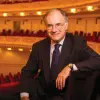Case Study
Carnegie Hall's Virtual Concert Series
Virtual
•January 2021
As we pivoted to virtual events, we knew we needed to find a company - like Happily - that would help us achieve a specialized event experience that matched what our donors and supporters expect when entering Carnegie Hall.

Ginger Vallen
Director of Special Events, Carnegie HallThe Challenge
Carnegie Hall is an internationally-renowned concert venue and non-profit performing arts institution dedicated to showcasing extraordinary music and musicians. The iconic building is a national historic landmark located on the corner of West 57th Street and Seventh Avenue in New York City, where it first opened its doors in 1891.
The Hall’s concert schedule is always filled with distinguished musicians and celebrated singers, rising stars, and the finest artists from around the world representing the best in all musical genres.
Carnegie Hall’s thriving and loyal audience includes longtime subscribers and a dedicated community of members and patrons. When the Hall was suddenly forced to close in March 2020 due to the COVID-19 pandemic, its concerts and event programs came to a standstill, preventing music lovers from coming together to enjoy remarkable performances. So if the audience could not come to the music, Carnegie Hall knew they had to find alternative ways to bring the music to them.
Although Carnegie Hall’s landmark building was closed for well over a year due to COVID-19, we remained strongly committed to the Hall’s mission of bringing the transformative power of music to the widest possible audience.
We achieved this largely through the development of exciting new online content and digital resources, ensuring that the Carnegie Hall community—including hundreds of thousands of young people engaged in our education and social impact programs and music lovers around the globe—could stay connected through music.

Clive Gillinson
Executive and Artistic Director, Carnegie HallThe Solution
Carnegie Hall partnered with Happily to produce new, signature livestream experiences that give donors access to exclusive artist performances and content. Our approach was to create a private microsite where an unlimited number of guests would be able to simultaneously view live content.
Each event was unique, with a distinct goal and audience, however, each one overall was approx. 45 minutes, with a live host to welcome and conclude the evening, as well as a live audience Q&A after pre-recorded video segments.
The Happily Broadcast Team was under the direction of Carnegie Hall’s development and media teams, to produce custom livestream broadcasts. A Happily Show Producer was in charge of the entire production aspect of the broadcast, which included building schedules and leading team meetings, creating the ROS (run of show) as well as calling cues during the show, and serving as the main point of contact for the Carnegie Hall team, the talent, and the backstage team.
A Happily Backstage Manager prepared speakers and talent for the broadcasts, and was their final checkpoint for stream quality before going live. A Happily Streaming Engineer was in charge of all the technical aspects of the broadcasts, which encompassed many things including assembling graphics and pre-records, as well as being responsible for the quality of the stream. A Happily Clock, which is a junior level technical streaming engineer, served as a timer for live hosts and talent.
From the Happily virtual Experiential Team, an Experience Attendant was in charge of administrative functions on the guests’ video conferencing platform, as well as troubleshooting any guest login issues on the day of the event and monitoring the guest experience stream for quality and security.
From the Happily Web Team, a Web Developer and Web Designer built a custom microsite with a landing page for each event. Each included a livestream broadcast in 720p or higher, a video conferencing experience for guests, artist images with their bio, as well as any sponsor logo and information.
It’s an understatement that these are extraordinary times. Throughout its 130-year history, Carnegie Hall presented performances throughout two World Wars, 9/11, various natural and man-made disasters, as well as another pandemic. Therefore, it was unthinkable that COVID-19 pandemic would force Carnegie Hall, along with all of New York’s performing arts institutions, to close down for such an extended period of time.
Although Carnegie Hall has been closed for over a year due to COVID-19, we’ve remained committed to our mission of bringing the transformative power of music to the widest possible audience. We achieved this largely through the development of exciting new online content and digital resources, ensuring that the Carnegie Hall community—including hundreds of thousands of young people engaged in our education and social impact programs and music lovers around the globe—could stay connected through music.

Clive Gillinson
Executive and Artistic Director, Carnegie HallThe Results
By partnering with Happily, Carnegie Hall was able to successfully bring music into homes, not only across the country, but also around the world.
Although nothing can replace the grandeur and magic of experiencing music live in Carnegie Hall, these virtual events allowed Carnegie Hall to stay connected to their community and to continue to bring energetic performances to their donors.
The virtual events included:
- Cocktails and Conversation featuring Emanuel Ax, February 16, 2021
- Carnegie Hall Notables Meet and Greet featuring Lullaby Project and NYO Jazz, March 18, 2021
- Cocktails and Conversation featuring Michael Feinstein, March 24, 2021
- Cocktails and Conversation featuring Yannick Nézet-Séguin, April 27, 2021
- Chairman's Evening featuring Kelli O’Hara, May 17, 2021
- Cocktails and Conversation featuring Leonidas Kavakos, June 17, 2021
- Carnegie Hall x Mastercard; I Love New York with Tony DeSare and Capathia Jenkins, June 24, 2021
Loading ...